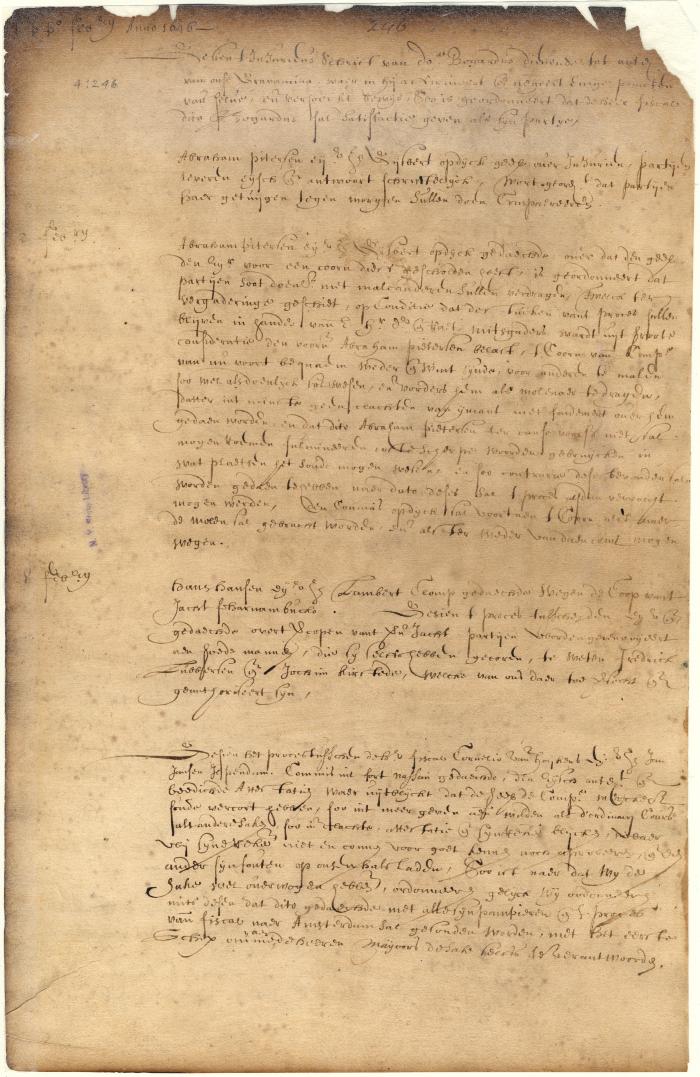On February 1, anno 1646[1]
Having seen the slanderous writing of Domine Bogardus, purporting to be an answer to our charges, wherein he affirms some and denies other points thereof and demands proof, it is ordered that the fiscal shall give said Bogardus satisfaction as his opponent.
Abraham Pitersen, plaintiff, vs. Gysbert Opdyck, defendant, for slander. Parties present their demand and answer in writing. Ordered that parties shall have their witnesses appear tomorrow.
February 2
Abraham Pitersen, plaintiff, vs. Gysbert Opdyck, defendant, because the defendant called the plaintiff a grain thief.
Ordered that parties, if possible, shall settle their difference with each other; which was done in court, on condition that the documents in the suit shall remain in the hands of the honorable director and council. Furthermore, for weighty reasons, the aforesaid Abraham Pietersen is ordered hereafter, wind and weather permitting, to grind the Company's grain as far as it is possible before that of others and further so to conduct himself as a miller that no one will in the slightest degree have any ground for complaint against him. The said Abraham Pietersen shall not be allowed to brag, inveigh, or make use of any sharp words in any place whatsoever on account of this suit, and if hereafter he be found to have acted contrary hereto, the suit shall then be continued. Commissary Opdyck shall hereafter be allowed to weigh the grain when it is brought to the mill and when it comes back from there.
February 8
Hans Hansen, plaintiff, vs. Lambert Clomp, defendant, on account of the purchase of the sloop Pharnambuco. Having seen the suit between the plaintiff and the defendant regarding the sale of the aforesaid sloop, the parties are referred to arbitrators of their own choice, to wit, Fredrick Lubbersen and Jochim Kirstede, who by us are requested and authorized to act in that capacity.
Having seen the suit between the honorable fiscal Cornelio van[ der ] Hoykens, plaintiff, vs. Jan Jansen Ilpendam, commissary of Fort Nassau, defendant, the complaint, answer and sworn affidavits, from which it appears that the defendant grossly wronged the Company both in giving to the Indians more than the ordinary rate of exchange and in other matters, as appears from the complaint, the affidavits and his accounts, which makes it impossible for us to audit or approve his accounts and to shoulder another's fault; therefore, having maturely considered the matter, we order, as we hereby do, that said defendant shall with all his papers and the fiscal's complaint be sent to Amsterdam by the first ship, to defend the case himself before the honorable directors.
Rights: This translation is provided for education and research purposes, courtesy of the New York State Library Manuscripts and Special Collections, Mutual Cultural Heritage Project. Rights may be reserved. Responsibility for securing permissions to distribute, publish, reproduce or other use rest with the user. For additional information see our Copyright and Use Statement Source: New York State Archives. New York (Colony). Council. Dutch colonial council minutes, 1638-1665. Series A1809-78. Volume 4, page 246.


